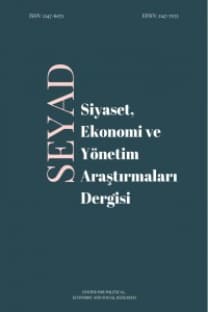Using Multinomial Logistic Regression to Examine the Relationship Between Children’s Work Status and Demographic Characteristics
Using Multinomial Logistic Regression to Examine the Relationship Between Children’s Work Status and Demographic Characteristics
Children, Working Children Multinomial logistic regression,
___
- Ağacabay, M. (2012). “Çocuk ve Çocuk İşçiliği Kavramları”. Eğitişim Dergisi, Issue: 33. Access link: www.egitisim.gen.tr Access date: 10.12.2015
- Boukhari, Construir Futuro, inventir en la infancia: “Estudio economico de los costos ybeneficious de erradicar al trabojo en Iberoamerica”. ILO, San Jose, Costa Rica, September 2005.
- Fidan, F. (2004). “Çalışan Çocuk Olgusuna Sosyo-Psikolojik Bakış Sanayide Çalışan Çocuklar Örneği”. Trakya University Journal of Social Science, 4(1): 30-49.
- Günöz, M. (2007). “Türkiye’de Çocuk İşçi Sorunu Ve Çözüm Önerileri (Dissertation)”. Republic of Turkey General Directorate of Labour and Social Security, Ankara.
- Hosmer, D. W. and Lemeshow, S. (2000). Introduction to the logistic regression model, in applied logistic regression, second ed. John Wiley & Sons, Inc., Hoboken, NJ, USA.
- Hosmer, D. W., Lemeshow, S., Sturdıvant, R. (2013). Applied logistic regression. Canada: Wiley & Sons Publication.
- Kahramanaoğlu, E. (1996) Türkiye’de Çalışan Çocuklar Sorunu ve Çözüm Yolları. Kahramanoğlu, E. (ed) Hacettepe University Academy of Social Services and Friedrich–Nauman-Foundation Publication, Ankara.
- Karaman, B. and Özçalık, M. (2007). “Türkiye’de Gelir Dağılım Eşitsizliğinin Bir Sonucu: Çocuk İşgücü”. Yönetim ve Ekonomi, 14(1): 30-41.
- Kayhan, N. (2012). “Çocuk İşçiliği, IPEC Deneyimi Işığında Sanayide Çalışan Çocukların Sorunları”. Hukuk ve İktisat Araştırmaları Dergisi, 4(1): 187-200.
- Kolk, A. and Tulder, R.V. (2002). “Child Labor and Multinational Conduct: A Comparison of Intarnational Business and Stakeholder Codes”. Journal of Business Ethics, 36(3): 291-301.
- Köksal, S. and Lordoğlu, K. (1993) Geleneksel Çıraklıktan Çocuk Emeğine: Bir Alan Araştırması. İstanbul: Friedrich Nauman Vakfı Yayınları.
- Kleinbaum, D.G. and Klein M. (2010). Logistic regression, a self-learning text, third edition. Springer.
- Liao, T.F.(1994). Interpreting probability models. Logit, probit and other generalized linear models. Quantitative Applications in the Social Sciences. Sage Publications.
- Long, S. and Freese J. (2006). Regression models for categorical dependent variables using STATA, second edition. College Station, TX: Stata Press.
- Tor, H. (2010). “Türkiye’de Çocuk İşçiliğinin Boyutları”. Zeitschrift für die Welt der Türken (ZfWT), 2(2): 35-39.
- “Republic of Turkey General Directorate of Labour and Social Security- Statistics”. Access link: http://www.csgb.gov.tr/csgbPortal/cgm.portal?page=cc&id=3. Access date: 15.12.2015.
- Washıngton, S., Karlaftıs, M., Mannering, F. (2003). Statistical and econometric models for transportation data analysis. Boca Raton FL.:CRC Press.
- ISSN: 2147-6071
- Yayın Aralığı: Yılda 2 Sayı
- Başlangıç: 2014
- Yayıncı: Politik Ekonomik ve Sosyal Araştırmalar Merkezi
Tüketim Toplumu Örneği Olarak Türkiye’nin Cari Açık ve Tüketici Kredileri İlişkisi
Engin DÜCAN, Melike Atay POLAT, Ercan BALCIOĞLU
Yerel Seçimlerde Seçmen Davranışları: 2014 Yerel Seçimleri ve Zonguldak İli Örneği
Türkiye’de Bilimsel Toplantıların Organize Edilmesi: TÜBİTAK Üzerine Bir Örgüt Geliştirme Önerisi
Volkan GÖÇOĞLU, Alper TURNA, M. Kemal ÖKTEM
Ferhat PEHLİVANOĞLU, Figen BÜYÜKAKIN
Murat ÇEMBERCİ, Mustafa Emre CİVELEK, Deniz GÜNEL
